2023届高考英语复习虚拟语气精品课件(29张PPT)
文档属性
| 名称 | 2023届高考英语复习虚拟语气精品课件(29张PPT) | 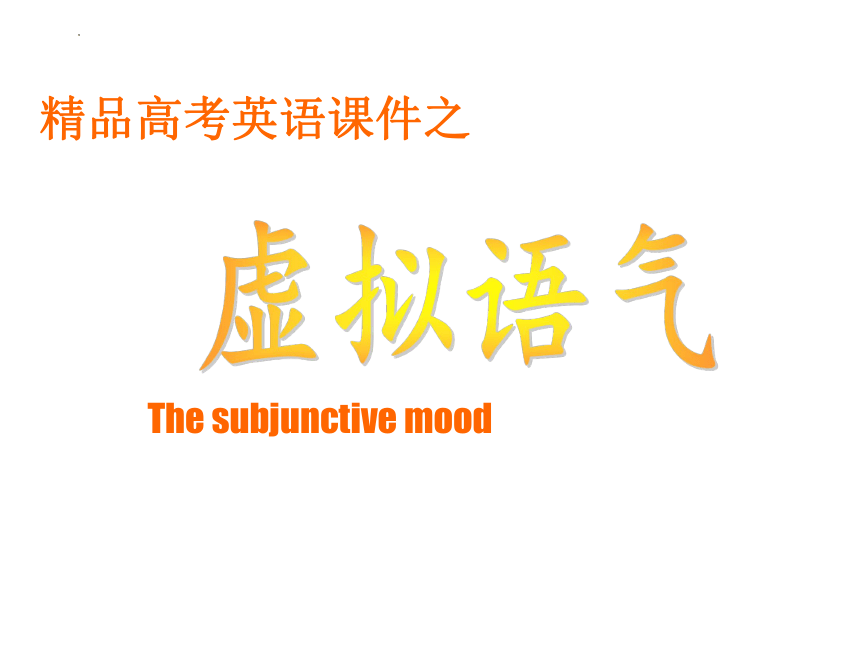 | |
| 格式 | zip | ||
| 文件大小 | 1.6MB | ||
| 资源类型 | 教案 | ||
| 版本资源 | 通用版 | ||
| 科目 | 英语 | ||
| 更新时间 | 2022-10-06 12:11:36 | ||
图片预览

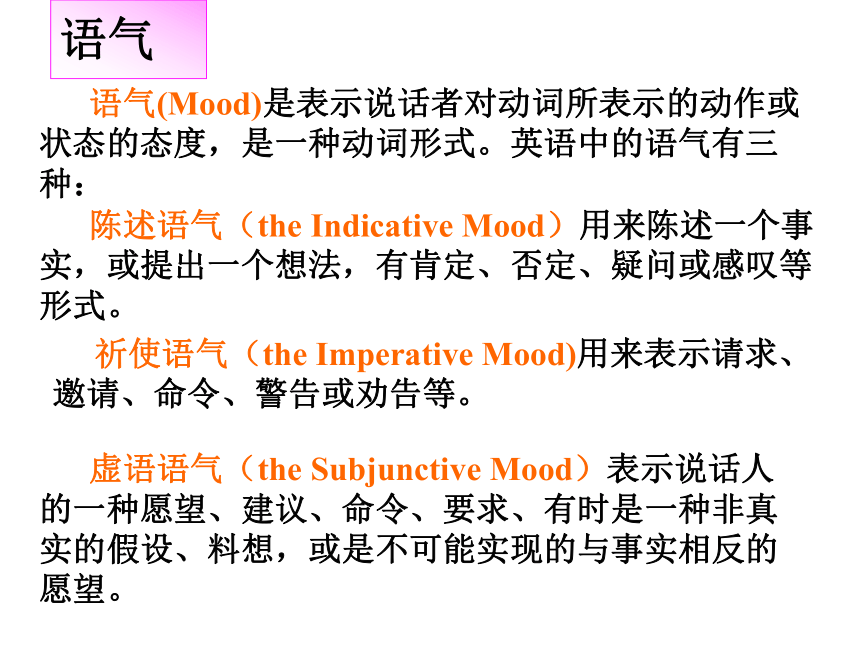
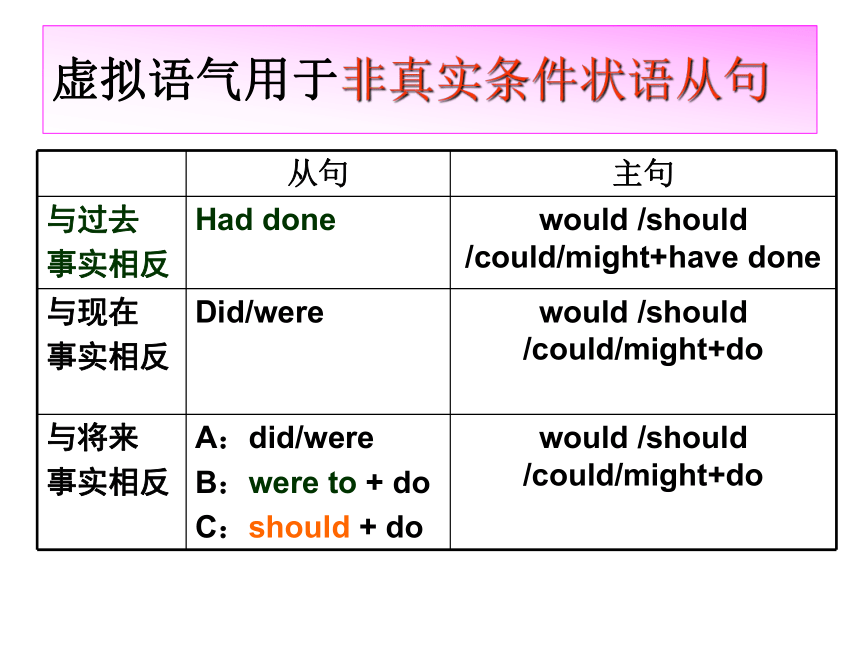
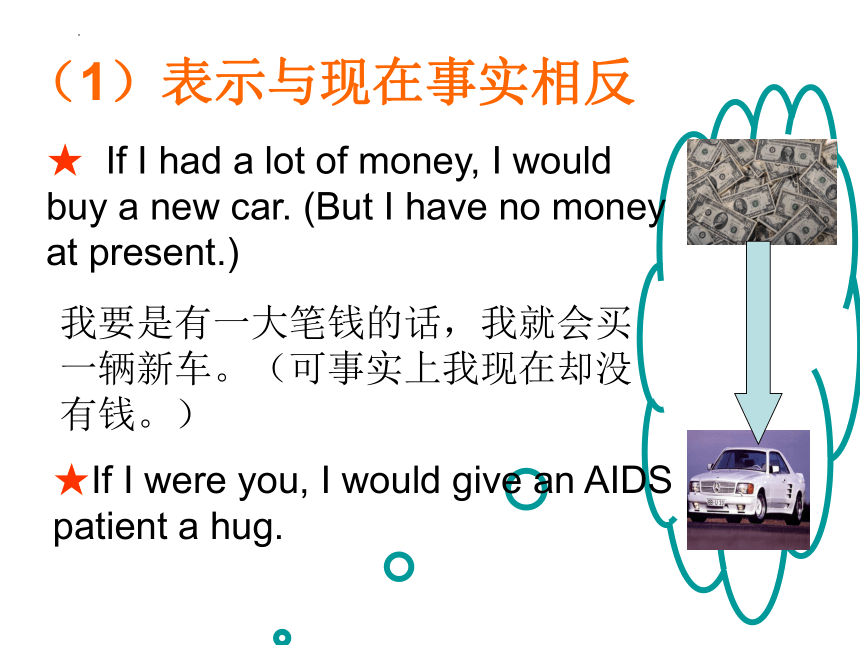
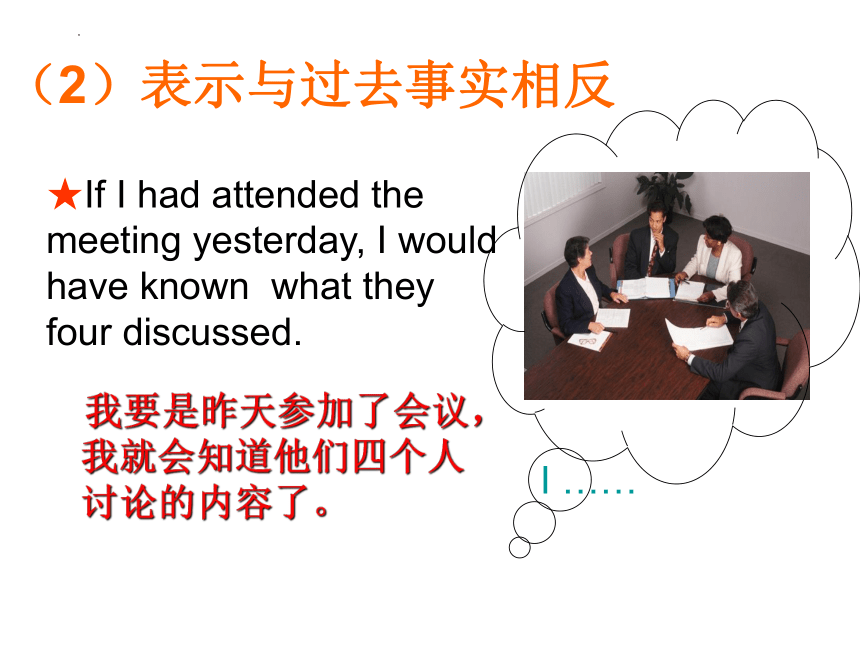
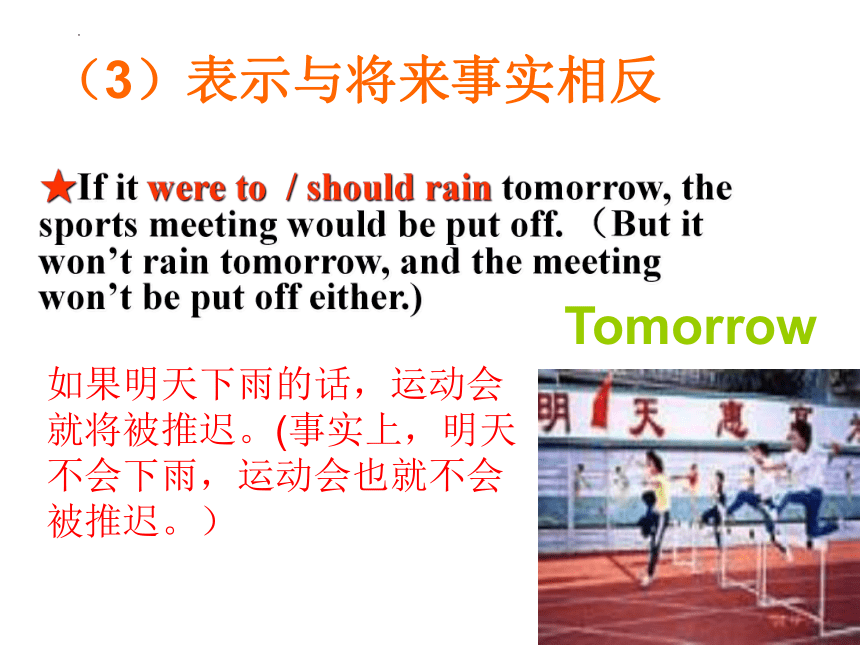
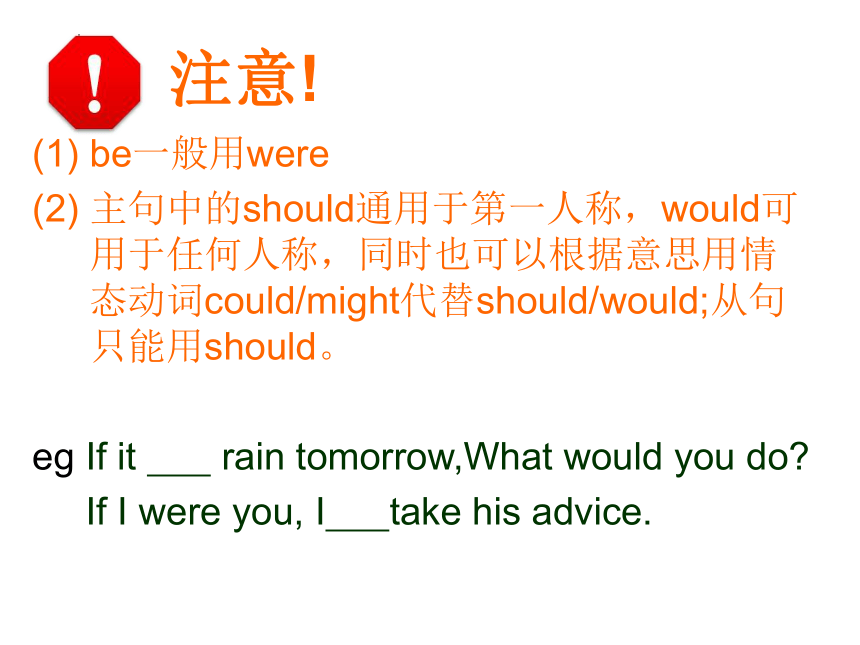
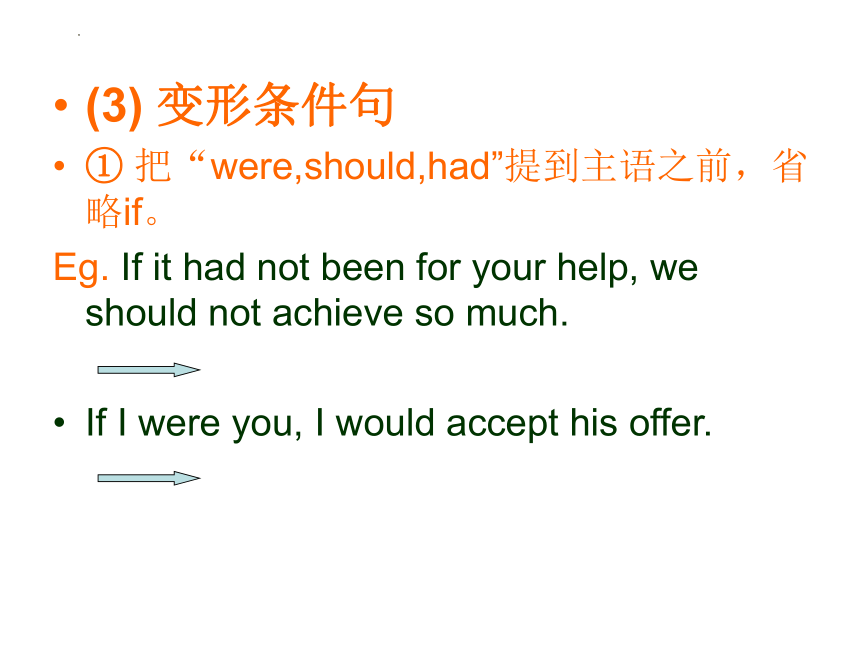
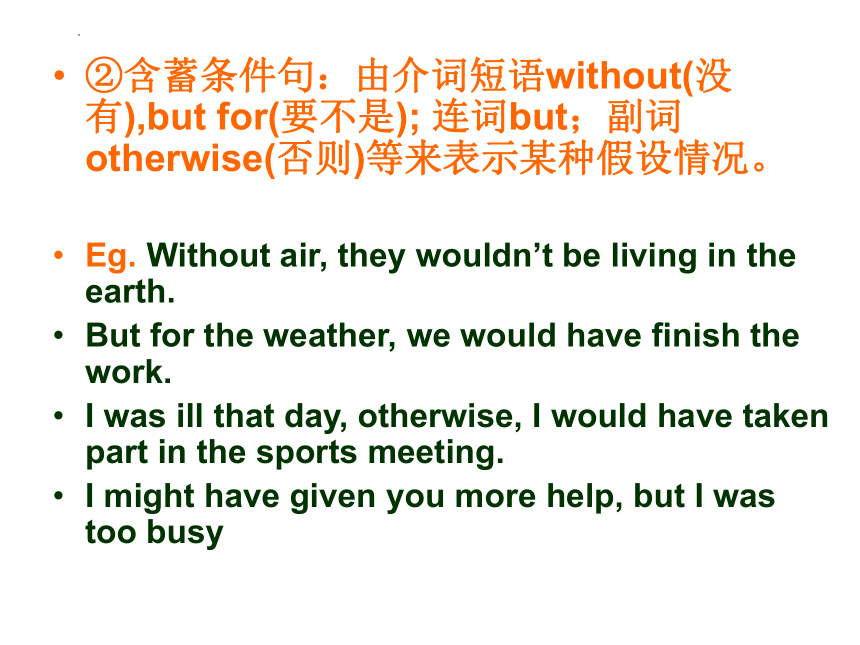
文档简介
(共29张PPT)
精品高考英语课件之
虚拟语气
The subjunctive mood
语气(Mood)是表示说话者对动词所表示的动作或状态的态度,是一种动词形式。英语中的语气有三种:
陈述语气(the Indicative Mood)用来陈述一个事实,或提出一个想法,有肯定、否定、疑问或感叹等形式。
祈使语气(the Imperative Mood)用来表示请求、邀请、命令、警告或劝告等。
虚语语气(the Subjunctive Mood)表示说话人的一种愿望、建议、命令、要求、有时是一种非真实的假设、料想,或是不可能实现的与事实相反的愿望。
语气
虚拟语气用于非真实条件状语从句
从句 主句
与过去 事实相反 Had done would /should /could/might+have done
与现在 事实相反 Did/were would /should /could/might+do
与将来 事实相反 A:did/were B:were to + do C:should + do would /should /could/might+do
(1)表示与现在事实相反
★ If I had a lot of money, I would buy a new car. (But I have no money at present.)
我要是有一大笔钱的话,我就会买一辆新车。(可事实上我现在却没有钱。)
★If I were you, I would give an AIDS patient a hug.
(2)表示与过去事实相反
我要是昨天参加了会议,我就会知道他们四个人讨论的内容了。
★If I had attended the meeting yesterday, I would have known what they four discussed.
I ……
(3)表示与将来事实相反
★If it were to / should rain tomorrow, the sports meeting would be put off. (But it won’t rain tomorrow, and the meeting won’t be put off either.)
如果明天下雨的话,运动会就将被推迟。(事实上,明天不会下雨,运动会也就不会被推迟。)
Tomorrow
注意!
be一般用were
主句中的should通用于第一人称,would可用于任何人称,同时也可以根据意思用情态动词could/might代替should/would;从句只能用should。
eg If it rain tomorrow,What would you do
If I were you, I take his advice.
(3) 变形条件句
① 把“were,should,had”提到主语之前,省略if。
Eg. If it had not been for your help, we should not achieve so much.
If I were you, I would accept his offer.
②含蓄条件句:由介词短语without(没有),but for(要不是); 连词but;副词otherwise(否则)等来表示某种假设情况。
Eg. Without air, they wouldn’t be living in the earth.
But for the weather, we would have finish the work.
I was ill that day, otherwise, I would have taken part in the sports meeting.
I might have given you more help, but I was too busy
③错综时间条件句
错综时间条件句,是指从句与主句的动作发生的时间不同。此时,需要按时间来确定虚拟形式。
从句指过去,而主句指现在
从句: had + 过去分词
主句: would/could + 动词原形
If they had studied hard, they could do it easily now.
从句指现在,而主句指过去
If he were free today, we would have sent him to Beijing.
If he knew her, he would have greeted her.
从句: 过去式(be用were)
主句: would/could + have + P.P.
If it were not for ……结构意为:“如果没有……”,表示同现在事实相反的假设。
从句中用过去式(be用were),
主句中用 would / should +动词原形。
If it were not for the water, the fish would not be that happy.
④ 特殊条件句
If it had not been for the ambulance coming in time, the wounded man would have been dead.
If it had not been for ……结构意为:“如果当时没有……”,表示与过去事实相反的假设。
从句中用过去完成式,
主句中用 would / should + have done
1. 用于表示命令、建议、要求、劝告等动词后的宾语从句中:
一坚持: insist(insistance)
二命令: order, command
三建议: advise, suggest,propse(propsal)
四要求: demand, request,require(requirement)
ask(asking)
“should+do”构成的虚拟
I suggested we go there by bus.
The official ordered his soldiers stand attention.
The premier proposed all drink to their friendship.
The CPC requires we learn from Comrade Leifeng.
We insisted that she (should) go with us
注意:
Insist 表示“坚决要求”时,用虚拟形式,即 should + do;
Insist 表示“坚称,坚持说”时,用陈述语气,表示事实。
He insisted that all of us should be there on time by any means.
他坚持要我们大家想尽办法按时去那儿。
He insisted that he was right.
注意:
Suggest 表示“建议”时,用虚拟形式。
Suggest 表示“表明、暗示”时,用陈述语气。
The teacher suggested that we (should) clean the blackboard after class.
The expression on his face suggests that he knows it.
2. 用于表语从句、同位语从句中
用于表示命令、建议、要求、劝告等名词词后的表语从句、同位语从句中:
We all agreed to his suggestion that we (should) go to Beijing for our summer vocation.
The suggestion is that we (should) go to Beijing for our summer vocation.
3.虚拟语气用于主语从句中
在主语从句中,谓语动词可以用虚拟语气表示惊奇,不相信,惋惜,理应如此等主观的情感,其谓语动词用(should) +动词原形。
基本句型:
(1) It be+过去分词+that…+(should)+do+…
suggested, requested, ordered, proposed, etc.
★ It is required that nobody (should) smoke here.
★ It’s suggested that everybody (should) buy a dictionary.
(2) It be + 形容词 + that…+ (should) do+…
important, necessary, natural, right, wrong, better,
proper, funny, strange, surprising…, etc.
★ It is necessary that we (should ) have a walk now.
★ It's important that we (should) take good care of the patient.
a pity /a shame/ no wonder, etc.
★ It is a pity that you (should) be so careless.
注:此种从句若表示惊奇的情感则用虚拟语气,否则也可以用陈述语气。
(3) It be+名词 +that…+ (should) +do+…
★ It is a pity that you didn’t come.
would / could/ mightshould +did
将来
did(be动词常用were)
现在
had +done
从句中虚拟语气的结构
从句动作发生的时间
注:当从句中的情况为可能发生的事或被设想为真实的时,从句也可以用陈述语气。
过去
由以下三种形式构成的虚拟语气
(1)虚拟语气用于以as if (as though)引导的表语从句或状语从句中
as if / as though 意为“似乎”,“好像”。常表示一种相反的事实。
★ looks as if he were a violinist.
He
(表语从句)
★ He coughed twice as if someone should come.
(状语从句)
★ They talked warmly as if they had known each other for long.
(状语从句)
(2)虚拟语气用于以if only引导的感叹句中
if only 意为“如果是……”,“要是……就好了……”
If only I were her.
感叹句中的动词用过去式(be用were)或过去完成式
我要是她就好了。
(3)虚拟语气用would rather 后接的从句中
would rather that
过去时
过去时
过去完成时
表示与客观事实不相符合的一种愿望。其具体结构为:
现在:
过去:
未来:
I would rather you painted the wall green next time.
(4)用于“wish + 宾语从句” 表不能实现的愿望,汉语可译为“可惜……”、“……就好了”、“悔不该……”、“但愿……”;其中有三种主要形式。
★I wish I had seen the film yesterday.
★I wish I were a great scientist now.
★I wish she would come on time tomorrow.
In fact, she won’t come on time tomorrow.
In fact, I didn’t see the film yesterday.
In fact, I am not a great scientist now.
英语中,表示“早该做某事了”时,定语从句中的谓语动须用虚拟语气,其虚拟语气的结构为:
★ It is high time that we were leaving.
★ It is high time that we should leave.
It is (high / about/right ) time that + 主语 + 过去式 (或 should + 动词原形)
Did 构成的虚拟语气
Thank you very much!
Goodbye!
精品高考英语课件之
虚拟语气
The subjunctive mood
语气(Mood)是表示说话者对动词所表示的动作或状态的态度,是一种动词形式。英语中的语气有三种:
陈述语气(the Indicative Mood)用来陈述一个事实,或提出一个想法,有肯定、否定、疑问或感叹等形式。
祈使语气(the Imperative Mood)用来表示请求、邀请、命令、警告或劝告等。
虚语语气(the Subjunctive Mood)表示说话人的一种愿望、建议、命令、要求、有时是一种非真实的假设、料想,或是不可能实现的与事实相反的愿望。
语气
虚拟语气用于非真实条件状语从句
从句 主句
与过去 事实相反 Had done would /should /could/might+have done
与现在 事实相反 Did/were would /should /could/might+do
与将来 事实相反 A:did/were B:were to + do C:should + do would /should /could/might+do
(1)表示与现在事实相反
★ If I had a lot of money, I would buy a new car. (But I have no money at present.)
我要是有一大笔钱的话,我就会买一辆新车。(可事实上我现在却没有钱。)
★If I were you, I would give an AIDS patient a hug.
(2)表示与过去事实相反
我要是昨天参加了会议,我就会知道他们四个人讨论的内容了。
★If I had attended the meeting yesterday, I would have known what they four discussed.
I ……
(3)表示与将来事实相反
★If it were to / should rain tomorrow, the sports meeting would be put off. (But it won’t rain tomorrow, and the meeting won’t be put off either.)
如果明天下雨的话,运动会就将被推迟。(事实上,明天不会下雨,运动会也就不会被推迟。)
Tomorrow
注意!
be一般用were
主句中的should通用于第一人称,would可用于任何人称,同时也可以根据意思用情态动词could/might代替should/would;从句只能用should。
eg If it rain tomorrow,What would you do
If I were you, I take his advice.
(3) 变形条件句
① 把“were,should,had”提到主语之前,省略if。
Eg. If it had not been for your help, we should not achieve so much.
If I were you, I would accept his offer.
②含蓄条件句:由介词短语without(没有),but for(要不是); 连词but;副词otherwise(否则)等来表示某种假设情况。
Eg. Without air, they wouldn’t be living in the earth.
But for the weather, we would have finish the work.
I was ill that day, otherwise, I would have taken part in the sports meeting.
I might have given you more help, but I was too busy
③错综时间条件句
错综时间条件句,是指从句与主句的动作发生的时间不同。此时,需要按时间来确定虚拟形式。
从句指过去,而主句指现在
从句: had + 过去分词
主句: would/could + 动词原形
If they had studied hard, they could do it easily now.
从句指现在,而主句指过去
If he were free today, we would have sent him to Beijing.
If he knew her, he would have greeted her.
从句: 过去式(be用were)
主句: would/could + have + P.P.
If it were not for ……结构意为:“如果没有……”,表示同现在事实相反的假设。
从句中用过去式(be用were),
主句中用 would / should +动词原形。
If it were not for the water, the fish would not be that happy.
④ 特殊条件句
If it had not been for the ambulance coming in time, the wounded man would have been dead.
If it had not been for ……结构意为:“如果当时没有……”,表示与过去事实相反的假设。
从句中用过去完成式,
主句中用 would / should + have done
1. 用于表示命令、建议、要求、劝告等动词后的宾语从句中:
一坚持: insist(insistance)
二命令: order, command
三建议: advise, suggest,propse(propsal)
四要求: demand, request,require(requirement)
ask(asking)
“should+do”构成的虚拟
I suggested we go there by bus.
The official ordered his soldiers stand attention.
The premier proposed all drink to their friendship.
The CPC requires we learn from Comrade Leifeng.
We insisted that she (should) go with us
注意:
Insist 表示“坚决要求”时,用虚拟形式,即 should + do;
Insist 表示“坚称,坚持说”时,用陈述语气,表示事实。
He insisted that all of us should be there on time by any means.
他坚持要我们大家想尽办法按时去那儿。
He insisted that he was right.
注意:
Suggest 表示“建议”时,用虚拟形式。
Suggest 表示“表明、暗示”时,用陈述语气。
The teacher suggested that we (should) clean the blackboard after class.
The expression on his face suggests that he knows it.
2. 用于表语从句、同位语从句中
用于表示命令、建议、要求、劝告等名词词后的表语从句、同位语从句中:
We all agreed to his suggestion that we (should) go to Beijing for our summer vocation.
The suggestion is that we (should) go to Beijing for our summer vocation.
3.虚拟语气用于主语从句中
在主语从句中,谓语动词可以用虚拟语气表示惊奇,不相信,惋惜,理应如此等主观的情感,其谓语动词用(should) +动词原形。
基本句型:
(1) It be+过去分词+that…+(should)+do+…
suggested, requested, ordered, proposed, etc.
★ It is required that nobody (should) smoke here.
★ It’s suggested that everybody (should) buy a dictionary.
(2) It be + 形容词 + that…+ (should) do+…
important, necessary, natural, right, wrong, better,
proper, funny, strange, surprising…, etc.
★ It is necessary that we (should ) have a walk now.
★ It's important that we (should) take good care of the patient.
a pity /a shame/ no wonder, etc.
★ It is a pity that you (should) be so careless.
注:此种从句若表示惊奇的情感则用虚拟语气,否则也可以用陈述语气。
(3) It be+名词 +that…+ (should) +do+…
★ It is a pity that you didn’t come.
would / could/ mightshould +did
将来
did(be动词常用were)
现在
had +done
从句中虚拟语气的结构
从句动作发生的时间
注:当从句中的情况为可能发生的事或被设想为真实的时,从句也可以用陈述语气。
过去
由以下三种形式构成的虚拟语气
(1)虚拟语气用于以as if (as though)引导的表语从句或状语从句中
as if / as though 意为“似乎”,“好像”。常表示一种相反的事实。
★ looks as if he were a violinist.
He
(表语从句)
★ He coughed twice as if someone should come.
(状语从句)
★ They talked warmly as if they had known each other for long.
(状语从句)
(2)虚拟语气用于以if only引导的感叹句中
if only 意为“如果是……”,“要是……就好了……”
If only I were her.
感叹句中的动词用过去式(be用were)或过去完成式
我要是她就好了。
(3)虚拟语气用would rather 后接的从句中
would rather that
过去时
过去时
过去完成时
表示与客观事实不相符合的一种愿望。其具体结构为:
现在:
过去:
未来:
I would rather you painted the wall green next time.
(4)用于“wish + 宾语从句” 表不能实现的愿望,汉语可译为“可惜……”、“……就好了”、“悔不该……”、“但愿……”;其中有三种主要形式。
★I wish I had seen the film yesterday.
★I wish I were a great scientist now.
★I wish she would come on time tomorrow.
In fact, she won’t come on time tomorrow.
In fact, I didn’t see the film yesterday.
In fact, I am not a great scientist now.
英语中,表示“早该做某事了”时,定语从句中的谓语动须用虚拟语气,其虚拟语气的结构为:
★ It is high time that we were leaving.
★ It is high time that we should leave.
It is (high / about/right ) time that + 主语 + 过去式 (或 should + 动词原形)
Did 构成的虚拟语气
Thank you very much!
Goodbye!
